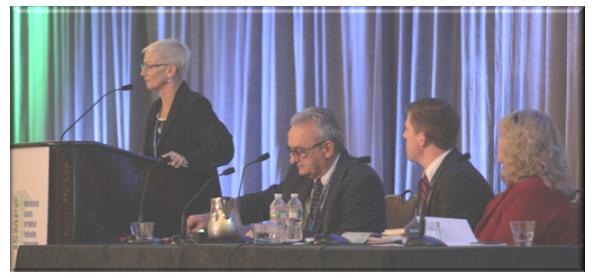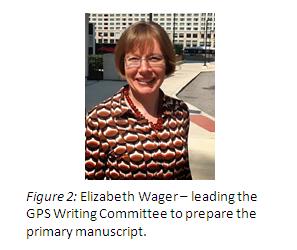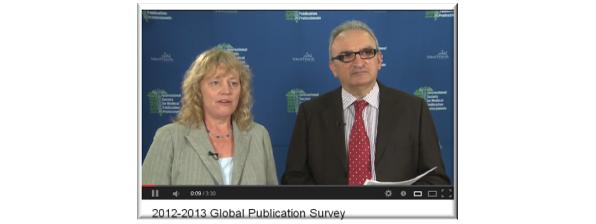The Global Publication Survey (GPS): update and implications

Tom Grant and Professor Karen Woolley provide us with an update to ISMPP's Global Publication Survey for medical communication professionals.
(Continued from "The global publication survey")
As discussed in a previous pharmaphorum article, the International Society for Medical Publication Professionals (ISMPP) is the founding sponsor of a major survey, The Global Publication Survey (GPS). The GPS results have provided valuable insights into current publication practices and clearly identified issues that our profession, authors, and editors still need to address.
Medical publication professionals play a pivotal role in facilitating the timely publication of clinical trial data in scientific literature and it is crucial that the profession does this in a highly ethical and transparent manner.
What sort of questions did the GPS address?
The GPS investigated respondents' awareness of guidelines, the amount and types of training received, company policies and standards (and the degree of transparency around these requirements), as well as compliance and auditing initiatives.
"The GPS results have provided valuable insights into current publication practices..."
What progress has been made with the GPS?
Since the last GPS article in pharmaphorum, great progress has been made! For example:
• A truly global Steering Committee oversaw the planning, conduct, and completion of the GPS – one of the biggest surveys of its kind.
• The data (LOTS of data!) have been collated by TGaS Associates, a benchmarking and advisory services firm.
• The eagerly awaited GPS results were presented by Karen Woolley at the ISMPP Annual Meeting in the US in May 2013. A highly interactive panel discussion and spirited audience Q&A session clearly showed the level of interest in this landmark survey.
Figure 1: GPS presentation at the ISMPP Annual Meeting (USA, May 2013; L-to-R):Karen Woolley, John Gonzalez, Josh Fullam, Viv Adshead
• The GPS Writing Committee, led by the first author, Elizabeth Wager, is currently preparing the primary manuscript for a peer-reviewed journal. In the spirit of transparency, the Committee aims to make the GPS dataset available, whilst ensuring respondent anonymity.
How was the GPS presentation at the ISMPP Annual Meeting received?
Those who attended the lively and well attended session at ISMPP were treated to a "report card" on their practices. There were many A+ efforts, but also areas where further education and advocacy are clearly needed...and not always where you might have expected. The profession cannot rest on its laurels; there is still work to do...and authors and editors will need to be engaged.
"Medical publication professionals play a pivotal role in facilitating the timely publication of clinical trial data in scientific literature..."
Here's what two of the GSP Steering Committee members had to say at the ISMPP Annual Meeting about the GPS (credit: ISMPP; MedThink SciCom):
Figure 3: Viv Adshead and John Gonzalez share their views at theISMPP Annual Meeting on the GPS results Video (3m30s):http://www.youtube.com/watch?v=TzRhCNYSHjs
Who do you think will be interested in the GPS publication?
All medical publication professionals should be interested in the GPS publication. However, authors and editors should also be interested in the paper – there are results that have clear implications for them. Indeed, we hope that the recommendations we make in the paper stimulate debate and action.
What are the implications of the GPS results - who needs to take action?
The GPS results could prompt a number of groups to take action, including:
• Pharmaceutical companies: The GPS results could be used to:
o Compare their publication practices with their peers.
o Identify where to dedicate resources.
"...we hope that the recommendations we make in the paper stimulate debate and action."
o Implement low-cost, high-profile ways to show how compliant their practices are.
o Encourage collaboration with national industry associations (eg, ABPI, PhRMA etc) to help raise awareness and compliance with publication standards around the world.
• Service providers: The GPS results could be used to:
o Reveal where clients are most likely to have compliance concerns
o Clarify and justify training and auditing initiatives
o Help win new business based on compliance practices that exceed those identified in the GPS service provider cohort
• Editors: The GPS results could be used to:
o Determine whether current publication practices challenge or reinforce editor concerns.
o Identify the type of publication misconduct that is being prevented by publication professionals.
o Evaluate the type and extent of potential bias from editors (eg, do some editors or reviewers judge manuscripts based on the disclosed funding source vs the quality of the research?).
o Encourage collaboration with global editor associations (eg, World Association of Medical Editors) to help address issues of mutual concern and to highlight how publication professionals are helping authors meet journal requirements.
"For the first time, our profession has a comprehensive dataset on publication practices..."
• Authors / investigators: The GPS results could be used to:
o Help authors insist on the highest publication standards from all sponsors.
o Identify where and how publication professionals can help authors meet compliance requirements.
o Engage with global medical associations (eg, World Medical Association) to develop standardised, high-quality, and evidence-based educational training programs for authors around the world.
What's next for the GPS?
Right now, we want to share the GPS results widely to help implement evidence-based education and advocacy efforts. For the first time, our profession has a comprehensive dataset on publication practices and we need to make the most of it! We're hoping to repeat the GPS (maybe in two years' time). We'll work hard to gain meaningful participation from authors and editors and to make the survey quicker and easier to complete.
About the authors:
For additional information about the GPS, go to http://www.linkedin.com/ (The Global Publication Survey Group) or follow the GPS on Twitter (@TheGPS1, #medcomms, #pubplan).
Tom Grant (BSc, PhD) has almost 28 years experience in the pharmaceuticals industry, including 11 years experience in medical publications management. Tom has a strong interest in sharing best practices in the medical publications profession and is an enthusiastic participant in ISMPP meetings and initiatives. He also has a passion for new, creative opportunities to communicate medical data.
Professor Karen Woolley (BHMS Ed Hons PhD CMPP) is a Trustee of the International Society of Medical Publication Professionals and Chair of its Asia-Pacific Advisory Committee. She is the CEO of ProScribe Medical Communications (www.proscribe.com.au; Australia, China, Japan), a Professor at the University of Queensland and the University of the Sunshine Coast (Australia), and is an Honorary Fellow of the American Medical Writers Association. She has a strong research interest in ethical publication practices.
What are your thoughts on the GPS publication?














